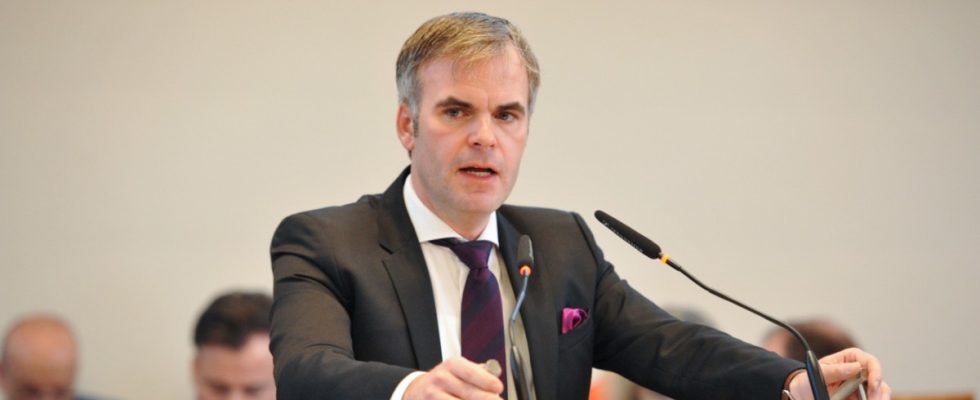The man who will have to go into debt in the coming years like no one ever has before is doing so of his own free will. He even expressed emotion after being given this task. Chamberlain Christoph Frey (SPD) promised that he would do his job for the next six years “with heart, brain and hard work.” Before that, the city councilors had expressed their confidence in him in a way that was not exactly obvious: Frey, who was elected for the first time in 2018 and is essentially Munich’s finance minister, received 66 of 75 valid votes when he was re-elected on Wednesday. Not only the government factions SPD/Volt and Green/Pink List gave him their votes, but also large parts of the opposition.
Mayor Dieter Reiter (SPD) is not known for lavishing praise on his top people, but he finds kind words for his treasurer. Frey managed the household “solidly and professionally in challenging times,” explained Reiter after the end of the meeting. “I am pleased that the city council has given him a new mandate with a large majority. The city’s finances are in good hands with him.” The second term will begin on November 1st.
CSU parliamentary group leader Manuel Pretzl had also previously certified the treasurer’s “serious and solid work”. “Apolitical and oriented to the cause.” That’s why the CSU/Free Voters faction supported him, whereas the FDP/Bavarian Party and the Left/The Party openly refused to vote for him. The treasurer pointed out to the city councilors early on what situation Munich would soon find itself in, said Pretzl.
He is alluding to the city’s financial situation, which will worsen dramatically in the coming years. The city could have a debt of nine billion euros by the end of 2027. However, this number will only be maintained if the treasurer manages to remove a few billion more from the investment program that has been decided so far. Otherwise it would be around 13 billion euros.
The majority of this will be spent on building schools, daycare centers and apartments as well as expanding local public transport. Some projects have to be pushed back and some may have to be canceled entirely. Negotiations with politicians are already taking place in the background.
Chamberlain Frey knows that Munich will have more liabilities than ever before at the end of the 2020s. Does it bother him that he will go down in city history as a record debt maker? Not if he sees what the money is being used for. “For the next generation. We are making the city fit for the future.” There is fundamentally a broad consensus between the major political groups. But Frey also knows that the coming years will be critical.
Roughly speaking, the city has to generate around 60 million euros per year for interest and repayment for every billion euros in debt. This means that in 2028 the city must generate a surplus of 540 million from its ongoing administrative business in order to keep the budget in compliance with the law. In 2023 she made a profit of 104 million euros. This year she hopes for an increase of 116 million euros. With the exception of a larger repayment to a company, trade tax has been stable at an enormous level for years. One of the biggest challenges of his second term in office will be presenting a budget that can be approved, said Frey. “This is priority A.”
The Free State and Federal Government should also invest more
It will be equally important in the coming years to renegotiate financial relations with the Free State and the federal government in Berlin. From Frey’s point of view, for example, the city pays 200 million euros too much per year for teachers in Munich. That would be the responsibility of the state of Bavaria. The federal government, in turn, not only has to promise more money to promote local public transport, but also pay out significantly more in the long term than before. “The big chunks lie in these topics,” said Frey.
He currently does not see a budget freeze for Munich that other cities have already had to declare. Such an emergency braking cannot be definitively ruled out; external influences such as a pandemic or war could always change the situation. This has been seen in recent years, said Frey. But investments of around two billion euros per year are still planned in Munich in the medium term. The fact that more than three were originally planned could not actually be described as saving.
Personnel costs of 44 million euros should be saved
The treasurer wants to cut almost 200 million euros in administrative expenses in the coming years: 150 million in material costs and 44 million in personnel. The ultimate goal must be that “we reduce where the citizens don’t notice.” The service for Munich residents should remain the same, but there must be changes in the work behind it. Frey sees potential, for example, in much greater digitalization.
Frey is hoping for 50 to 80 million euros in future income from the so-called bed tax. Munich wants to charge tourists this, but the Free State has banned this. Now judges have to decide whether the city can charge taxes on overnight stays. The treasurer rules out an increase in trade tax. “We already have a relatively high assessment rate,” he said.

